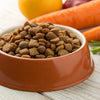What to Feed My Dog to Make Him Gain Weight: A Comprehensive Guide
- Houndsy
Table of Contents
- Introduction
- Understanding Canine Weight Management
- What to Feed Your Dog for Healthy Weight Gain
- Exercise and Weight Gain
- When to Consult a Veterinarian
- Conclusion
- FAQ
Introduction
Did you know that millions of dogs in the U.S. are considered underweight? For many pet owners, the struggle to help their furry friends gain weight can be just as concerning as dealing with obesity. If you’ve noticed that your dog seems too thin, lacks energy, or has a dull coat, you’re not alone. Many of us wonder, what to feed my dog to make him gain weight?
In this blog post, we will explore various aspects of canine nutrition that can help your dog achieve a healthy weight. We will discuss the nutritional needs of dogs, the types of foods that promote weight gain, and practical feeding strategies to ensure your pet not only gains weight but does so healthily.
By the end of this article, you’ll have a well-rounded understanding of how to boost your dog’s weight safely and effectively. We invite you to reflect on your dog’s current feeding routine and consider how you can implement some of the strategies we’ll discuss.
Let’s dive in!
Understanding Canine Weight Management
The Importance of Weight in Dogs
Maintaining a healthy weight is crucial for your dog’s overall well-being. Just like humans, dogs can face a myriad of health issues related to their weight. Being underweight can lead to weakened immune systems, lower energy levels, and a host of other health complications.
We’ll explore the signs of underweight dogs and why it’s essential to address the issue effectively.
Signs Your Dog May Be Underweight
- Visible Ribs and Spine: If you can easily see or feel your dog’s ribs and spine without applying pressure, it may be time to reassess their diet.
- Lethargy: A lack of energy or interest in play could signify that your dog isn’t getting the calories they need.
- Dull Coat: A shiny, healthy coat is often an indicator of good nutrition. A dull or patchy coat could suggest malnourishment.
- Weight Loss: Sudden or gradual weight loss can be concerning, especially if it coincides with changes in appetite or behavior.
If you notice these signs, consulting a veterinarian is a crucial first step to rule out any underlying health issues.
Potential Causes of Weight Loss
Various factors can contribute to a dog being underweight, including:
- Medical Conditions: Diseases such as diabetes, hyperthyroidism, or gastrointestinal disorders can affect a dog's ability to gain weight.
- Stress or Anxiety: Dogs can lose weight due to stress caused by changes in their environment, such as moving to a new home or the introduction of new pets.
- Dietary Issues: Inadequate nutrition or a diet lacking in calories can hinder weight gain.
Understanding these factors will help us determine the best approach to feeding your dog for healthy weight gain.
What to Feed Your Dog for Healthy Weight Gain
The Role of Nutrition
To help your dog gain weight effectively, it’s essential to focus on a diet that is rich in the right nutrients. Dogs require a balanced diet comprising proteins, fats, and carbohydrates. However, for weight gain, the emphasis should be on high-calorie foods that are both nutritious and appealing.
High-Calorie Foods
- Premium Dog Food: Look for high-quality dog foods specifically formulated for weight gain. These foods are often richer in fat and protein, making them more calorically dense.
- Wet Food: Many dogs find wet food more palatable than dry kibble. Mixing wet food with dry can enhance the flavor while still providing the necessary nutrients.
- High-Protein Treats: Incorporating treats like chicken, beef, or fish into your dog’s diet can provide additional calories. Just ensure they are made from high-quality ingredients.
- Healthy Fats: Include sources of healthy fats, such as fish oil or coconut oil, in your dog’s diet. These not only provide calories but also support overall health.
- Eggs: Eggs are a fantastic source of protein and healthy fats. They can be served boiled, scrambled, or even raw (if you’re cautious about food safety).
Human Foods That Can Help
Many pet owners wonder if they can share some of their own foods with their dogs. Here are a few human foods that dogs can safely eat and that can help them gain weight:
- Peanut Butter: A favorite among many dogs, natural peanut butter (without xylitol) is high in calories and can be mixed into their meals or given as a treat.
- Sweet Potatoes and Pumpkin: These are excellent sources of fiber and carbohydrates, helping to promote weight gain while supporting digestive health.
- Cottage Cheese: This is a great source of protein and can be added to your dog’s regular food. Most dogs enjoy the taste, making it an easy addition.
- Rice: Cooked rice can provide carbohydrates that are easy on the stomach and can help settle any digestive issues.
Recommended Feeding Strategies
- Frequent Small Meals: Instead of two large meals, consider feeding your dog three to four smaller meals throughout the day. This approach can help them consume more calories without overwhelming their digestive system.
- Scheduled Feeding Times: Establishing a consistent feeding schedule can help your dog know when to expect meals, which may stimulate their appetite.
- Add Healthy Toppers: Adding a few healthy food toppers to your dog’s meals can entice picky eaters. Toppers can include wet food, pumpkin puree, or even a bit of low-sodium broth.
- Monitor Progress: Keep a journal of your dog’s meals, treats, and weight changes. This allows you to track their progress and make adjustments as needed.
Exercise and Weight Gain
The Role of Exercise
While it might seem counterintuitive, exercise plays a critical role in helping your dog gain weight. Regular exercise helps build muscle mass rather than just adding fat, which is crucial for a balanced, healthy weight.
- Strength Training: Incorporate activities that strengthen your dog’s muscles, such as walking uphill or playing tug-of-war.
- Engagement: Engaging your dog in playtime or agility exercises can stimulate their appetite and improve their overall fitness.
- Avoid Over-exertion: After meals, ensure your dog rests for a bit to prevent digestive discomfort. However, regular light activity can encourage calorie burning and muscle development.
When to Consult a Veterinarian
If you’ve tried various strategies and your dog is still struggling to gain weight, it’s essential to consult a veterinarian. They can assess your dog's health and possibly recommend a specialized diet or additional supplements.
Potential Medical Interventions
In some cases, your vet may recommend:
- Prescription Diets: These diets are specifically formulated to provide extra calories and nutrients for dogs needing to gain weight.
- Nutritional Supplements: Adding supplements designed for weight gain can enhance your dog’s diet, especially if they have specific dietary needs.
Conclusion
Helping your dog gain weight is a multifaceted process that involves understanding their nutritional needs, providing high-calorie foods, and ensuring they engage in regular exercise. By focusing on a balanced diet of premium dog food, healthy human foods, and strategic feeding practices, we can help our furry friends achieve a healthy weight.
Before making any significant changes to your dog’s diet or routine, it’s always a good idea to consult with your veterinarian. They can provide guidance tailored to your dog’s unique needs.
As you consider ways to improve your dog's feeding routine, think about how innovative products can simplify the process. The Houndsy Kibble Dispenser, for instance, can make feeding more convenient and consistent, ensuring your dog gets the right portions every time. Explore our Houndsy Kibble Dispenser here.
FAQ
How do I know if my dog is underweight?
To check if your dog is underweight, look for prominent ribs and spine, a lack of energy, and a dull coat. If you're unsure, consult your veterinarian for a professional assessment.
What types of food should I avoid for weight gain?
Avoid low-quality dog foods that are high in fillers and low in essential nutrients. Also, steer clear of human foods that are toxic to dogs, such as chocolate, grapes, and onions.
Can I use treats to help my dog gain weight?
Yes! Healthy high-calorie treats, like peanut butter or meat-based snacks, can help add extra calories to your dog's diet.
How long should it take for my dog to gain weight?
Weight gain can vary depending on your dog's starting weight and diet. Generally, a healthy rate of weight gain is about 1-2% of their body weight per week.
What should I do if my dog refuses to eat?
If your dog consistently refuses to eat, consult your veterinarian to rule out any underlying health issues. You might also consider changing their food or adding enticing toppers to encourage eating.












